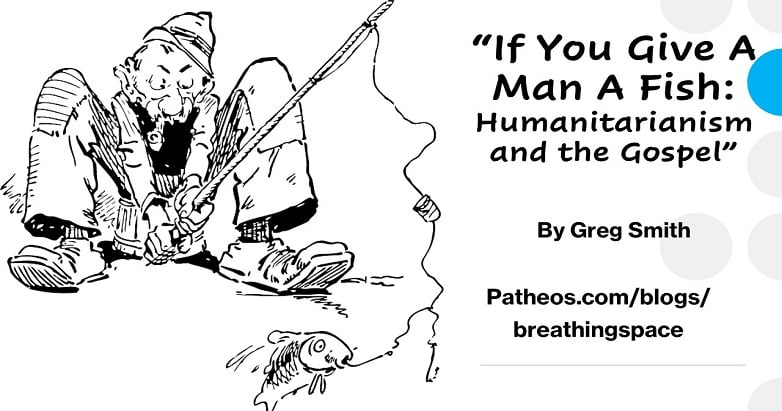If you give a man a fish, you will feed him for a day. If you teach a man to fish, he will have food for life. There’s a lot of truth in that aphorism. But if you try to teach a man to fish while his belly is empty, he’ll be too distracted to learn. It’s not either-or, but both-and.

Biblical Law
The Bible has a lot to say about humanitarianism. The Jewish law did not provide for a welfare system governed by the state. There was no social security for retirees and no disability programs for disabled people. Mental health wasn’t even a consideration in biblical times. Still, the Jewish faith provided for people in need.
The Hebrew scriptures commanded farmers to refrain from harvesting the edges of their fields. This way gleaners would have ample supply. It was the responsibility of wealthy landowners to make sure that the poor had what they needed. It was a sin to be so focused on their own profit that they neglected the poor. Of course, charity wasn’t just for the wealthy. Everyone had the opportunity to give alms to provide for the destitute. Almsgiving was not seen as mere human compassion, but also as a sacred duty.
Jesus’ Ministry
Much of Jesus’s Ministry was centered around acts of charity and compassion. When he multiplied the fish and loaves, Jesus demonstrated that he cared about putting food in people’s bellies. Likewise, Christians must make it their business to feed the hungry. As the Great Physician, Jesus healed people everywhere he went. The church took this as an example and has been one of the greatest founders of hospitals around the world. Jesus’s Ministry of exorcism is a call for Christians to care for those who are mentally ill. Those who take their calling as Christ-followers seriously must also be concerned for the mental and spiritual well-being of others. Following Jesus means caring for the whole person.
Paul’s Example
The religion that Paul established around Jesus’ teachings continued in Christ’s example. Paul regularly instructed the churches to collect offerings for those in need. Sometimes Paul’s churches contributed to the needs of their neighbors. Other times their donations traveled great distances to help those in need. These offerings also provided for those who did humanitarian work, giving up secular employment for the sake of ministry. Paul commended those who gave abundantly and chastised believers who withheld their financial means from those in need. He reminded believers that those who sow generously would reap abundance, but those who sow sparingly will reap little.
The Bare Necessities?
Many people resent when they see recipients of charity spending their money lavishly. I’ve heard folks complain about people on food stamps buying lobster. But doesn’t every human deserve the right to celebrate from time to time? Jesus knew that charity wasn’t always about providing the bare necessities. Sometimes it’s about the extras. He didn’t need to turn water to wine so people at the wedding feast could revel for days—but he believed some things were important enough for extravagance. When Judas criticized the wastefulness of the woman who anointed Jesus’s feet with costly perfume, the teacher defended her. Sometimes you need a little extravagance and celebration. Jesus never begrudged anyone this luxury.
Not Just Giving, but Doing
Jesus’s story of the Good Samaritan shows that charity isn’t all about throwing money at problems. It’s also about getting your hands dirty and even putting yourself in a little jeopardy to help those in need. With the religious leaders saw their countryman beaten and left for dead on the side of the road, they crossed to the other side to avoid him. They had better things to do and wanted to avoid ritual contamination that might prevent them from performing their tasks at the temple. Further, they wanted to hurry on by rather than stop to become a potential target for thieves themselves.
But the Samaritan, used to being rejected, had compassion of the sufferer on the roadside. He got off his donkey, bandaged the man’s wounds, put the man on the Samaritan’s own animal, and walked the rest of the way himself to deliver the man to an inn. He even paid the innkeeper for the man’s care. Jesus’ parable shows that humanitarianism is not all about giving, but also about doing the work of helping others.
The Sheep and the Goats
In Matthew 25:31-46, Jesus praises his followers who make humanitarianism their mission. “I was hungry, and you fed me. I was naked and you clothed me. I was a stranger, and you took me in. I was sick and in prison, and you came to visit me.” Those who practice their love by helping others, Jesus calls the sheep. In this parable, they can’t recall a time they had helped Jesus in these situations. But he explains to them, “Whatever you have done to the least of my brothers and sisters you have done to me.”
Those who see the needs of fellow human beings but refused to care for them, Jesus calls the goats. They can’t remember seeing Jesus in such need and refusing to help him. But Jesus tells them, “Whatever you have not done for the least of my brothers and sisters, you have not done for me.” If there is a litmus test for true faith, it isn’t about doctrine. It’s about whether those who call themselves Jesus’ disciples follow his example and teaching by living out their love and helping others.
Why does Jesus call them sheep and goats? While both animals are known for grazing, sheep provide for others by donating their wool. Sheep only eat grass and hay, while goats consume everything. Are you a consumer, only living for what you can put in your own belly? Or are you a donor, taking only what you need and using your resources to care for others? If you call yourself a Christian, you must know that humanitarianism is intrinsic to our faith. This is true in the way that you behave as an individual, and in the way you vote for policies and politicians to help those in need.
If You Give a Man a Fish…
Jesus calls all his followers to help others when they can. But too often when it is in our power to do good, we withhold that good from those in need. This demonstrates our lack of faith that God will provide for our own needs. Hoarding our resources for ourselves instead of helping others shows that we trust more in our own provision than in God’s. It also communicates a lack of love and compassion for struggling people who are made in God’s image. When we refuse to help because we can’t even imagine ourselves being in a similar position, our privilege is showing. Jesus never said, “If you give a man a fish…” Instead, he just gave.
The worst thing about that fishing aphorism is when you hear it quoted by members of church benevolence committees while voting against helping a neighbor in need. They don’t want to give up any of their own fish to fill someone else’s belly. Truth be told, they don’t want to teach the man to fish either. Furthermore, the only way to really help is to do both things. Help with the short-term, and also resources for the long term. It’s both-and, not either-or.












